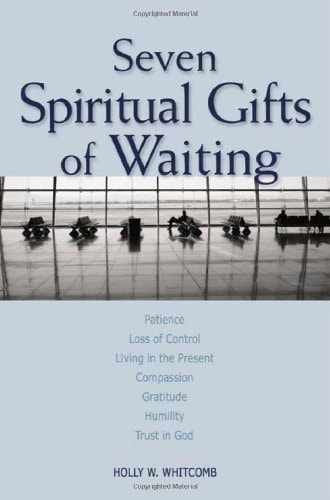Waiting and Waiting
Sometimes it's good to wait patiently and calmly. Sometimes it's good to wait impatiently and anxiously.
The mistake to think that one or the other is always best. Everything depends on the context.
The mind of the universe -- the One who is Love -- embraces and partakes
of both kinds of waiting: the patient and the impatient, the calm and the anxious.
Waiting for Justice
Waiting in Cages
Daily Life Waiting
Quotes on Waiting
Beyond Mindfulness
I'm sick of this middle-class Buddhist crap about every moment being a "precious" moment and about how we can live "mindfully" in each moment, with relaxed yet alert attention, and a peaceful heart. I am waiting to find out the results of my daughter's exam for cancer. I am a little hopeful and a lot worried. Spare me the platitudes about heaven being in the here and now. I'm waiting for a better future. I place my trust in an anxious God who, like me, isn't sure what's going to happen next. We are waiting together.
-- Heard in an Oncology Ward
Free to be Anxious
Sometimes it’s good to wait patiently and sometimes it’s a sin to wait patiently. Sometimes patient waiting can nourish a soul and sometimes patient waiting is mere anesthesia: a way of hiding from life’s pain when angst is the more honest response. Jesus was not an especially patient person, nor were many other biblical prophets. A spirituality of waiting will welcome patient waiting and impatient waiting, neither to the exclusion of the other, and knowing that, in certain contexts, angst is itself a way of sharing in the divine life. A healthy spirituality includes, and welcomes, the freedom to be anxious.
Waiting and Fear |
Waiting in the New Testament |
Waiting as a Practice of Patience Waiting as Availability to Grace |
Waiting as Suffering |
Waiting as a Cure for Impatience Waiting as Incremental (One Day at a Time) |
Waiting
Paul O. Ingram
Pacific Lutheran University (Emeritus)
|
|
For God alone my life waits in silence,
For my hope is from him. (Psalm 62:56)[1] “Waiting” is such a mysterious word. A year ago, I waited for the proofs of my newest book, Faith as Remembering, to arrive on my computer from Cascade Books so I could begin the process of going over everything: checking for typos, clarifying my editor’s questions, making sure references were accurately listed in their proper form (which differs from publisher to publisher), particularly checking for spelling errors, and everything else a manuscript requires for publication. I went through this process three times before I sent my final revisions to my editor, K. C. Hanson. I waited another month for him to return the manuscript for my approval. Finally, we both signed off on the manuscript and K. C. and sent it to the printer, who sent me his proofs. I checked the final proofs, sent them back to the printer, and waited another month before the manuscript was published. Before this three-month-long process began, I waited nine months before I received word that the manuscript had been accepted for publication. , Now that Faith as Remembering is in print I am in another waiting state. “What’s next?” is the question all writers encounter after publication. “What’s next” is a waiting state in which all writers, artists—all creative persons—find themselves. In my case, it seems that after every book I’ve published I run out of gas, yet still hope to do more writing, hoping something will come to me worth writing about, something about which I can write. Putting things into words is such a mysterious process and all writers are engaged in a life-long waiting game to find the right words. So I continue to wait and hope, knowing there are no guarantees. To be alive is to play a waiting game. We wait for everything even as different people wait differently; for the bus, for our first driver’s license, our first car, our first date, our first prom, for graduation from high school and college, in my case for graduation from seminary and graduate school, for my marriage to Gena, for my first teaching job, for my first contract at Pacific Lutheran University and for tenure five years later, moving through the adoption processes for my children, Gail and Rob, waiting and watching as Gail and Rob grew into adulthood and waiting and watching afterward, waiting for my grandson, for everything that makes life alive, for death and, if one is grounded by Christian faith, for resurrection. All hope is a waiting game. Waiting is a kind of suspended animation. Time solidifies like a dead weight. The mind reddens a little with anger and then blanks off into a sort of abstraction and fitfully wanders, but presently it comes up red and writhing again, straining to get loose. Waiting casts one's life into little dungeons of time. It is a way of being controlled, of being rendered immobile and helpless. One can read a book or sing or chat with strangers, if the wait is long enough, to begin forming a bond of shared experiences. Being in a waiting state is ultimately a meditation on the meaning of a life when it dawns on you that your days are numbered. Days go by. Time flies. We rely on clichés to describe the passage of minutes, hours, days, weeks, months, and years. I often wonder about how my time passes. Where did it go? What did I do? What have I accomplished? What am I waiting for? But, I find my most precious moments, those that I want to sear into my brain, in the regular humdrum of my life. My grandson tells endless jokes, some of which are as funny as a rubber crutch. The love that grows and builds with my family day in and out. The conversations I have with my wife. The unexpected kindness and joy of friends and neighbors. But there is something else. That finite amount of time each of us has before we come to our ends is filled with waiting and action, and most days appear unremarkable as we search them for meaning. This form of waiting requires trust that the future will turn out better than we can imagine. Waiting in trust is how Martin Luther defined “faith through grace.” For, as Annie Dillard wrote, “Not only does something come if you wait, but it pours over you like a waterfall, like a tidal wave.”[2] That “something” is grace. When we wait without expectation or hope, emptied, translucent, then that which comes rocks and topples us; it will shear, loose launch, winnow, and grind. Wait for it! There must be a sermon here somewhere. [1] I have translated the original Hebrew nefesh as “life.” The New Revised Standard translation translated the original Hebrew as “soul,” which is inaccurate since the Tanach does not employ anything like “soul” in it its texts. Nefesh is literally “life,” what Genesis describes as a force breathed into the nostrils of Adam that made him alive. See. Gen 2:7) [2] Annie Dillard, Pilgrim at Tinker Creek (New York: Harper and Row, 1974), 259. |








